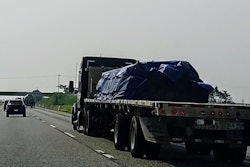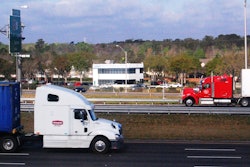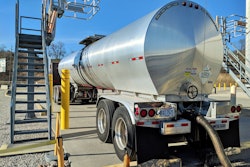Though not new by any stretch, the problem of double brokering has exploded in recent years, and owner-operators are the ones left unpaid at the end of the day as a result. Double brokering can show up in many forms and with different results, and it can be difficult to detect as a carrier.
Perhaps the most widespread scheme is that of duly authorized motor carriers and brokers clearly working together to essentially misrepresent themselves into a load that comes from a very real broker or shipper and eventually makes its way to a very real carrier, but at a rate that’s reduced from the original load agreement. This sort of double brokering relies on the ease of entry into the business and the low-manpower issues authorities have often cited over the last decade when asked why, for instance, the misrepresentation section of the broker regs (49 CFR 371.7) wasn’t being enforced with any real might, given the wide extent of this problem.
Some in the enforcement/legal community describe it with an analogy to the hub and spokes of a wheel, with untold numbers of carrier authorities set up as spokes and all connected to a brokerage authority at the hub to whom these carriers pass loads negotiated on internet boards to broker out to real carriers at reduced rates. The entire operation then pockets the difference, the load gets moved, and everybody gets paid, including the organized, illegally operating double brokers.

Other schemes involve out-and-out hacks of a carrier and/or broker's account within the Federal Motor Carrier Safety Administration's registration system, where identity thieves then change information there to pretend to be a real carrier. Such instances and others, with extra parties inserted into the freight transaction, can often result in misdirection of the eventual real trucker to a new location, where thieves then steal the load itself. Such theft schemes have been on a well-documented rise in recent years.
Other schemes could involve a provider or pretend provider of dispatch services calling an independent’s insurance agent asking for the owner’s certificate of insurance (COI). Those certificates can be another potential vector for business identity thieves who might then fairly easily do one of many things to eventually ruin your credit rating -- and credibility as a carrier.
Credibility is a chief consideration, particularly in a down market for brokered freight. In response to increasing levels double brokering and other fraud schemes, brokers have come to rely more on one or another so-called "carrier vetting" systems as a way to gain intel on motor carriers they haven't done business with regularly.
One of those systems, essentially an online review site, has a very large reach and importance in the brokered-freight marketplace. In 2024, the company, Carrier411, adopted a policy of permanence for all broker reviews posted there after a 72-hour period.
Getting unwittingly involved with a double broker could lead to bad reviews from brokers, and/or threats of bad reviews from entities attempting to keep you on the hook to move a load when you confront a broker about double brokering. To preserve your credibility in the marketplace, it's important to know the policies of these carrier vetting systems.
When a broker files an allegation/review, Carrier411's FreightGuard system sends an automated email to the address on file associated with the carrier's federal profile/filings, inviting the carrier to respond directly to the broker.
After that, the carrier and reporting broker have 72 hours to figure something out before the report becomes essentially permanent, un-deletable. It's a good idea to check that FMCSA-registered email's inbox often when working with brokers on the spot market. When attempting to resolve a dispute, it's important to:
- Respond promptly
- Don't threaten, spam, or retaliate
- Treat it as a "business dispute," in the words of one attorney, taking any emotion out of it.
Other vetting platforms have various means and contacts through which to resolve disputes about information contained there as well. The Highway company's central [email protected] email address is their principal contact.
The Carrier Assure company's [email protected] is listed on that company’s website as the carrier contact for disputes, particularly important there given, like in Carrier411's FreightGuard system, brokers are invited to review their experience with carriers. Assure encourages broker reporting of things like double brokering, hostage loads and other so-called “SuspectCarrier” reports. Assure also sends notification emails to individual carrier entities anytime such a report is lodged.
At the Truckstop load board's RMIS carrier-monitoring service for brokers, carrier support needs flow directly through the Truckstop RMIS support team at 888-643-8174 or by email at [email protected].
Reviews are a two-way street -- ways to bring investigatory resources to bear
Online reporting of double brokers for public consumption just isn't as well-established for carriers as it is for brokers, yet the big load boards present an option -- both DAT's Directory and Truckstop.com's review capacity serve as a repository for broker reviews. Yet the realities of over-the-road work for owner-operators probably has a lot to do with the utility of such services, underutilized as they are by carriers.
Investigatory resources can be brought to bear around freight transactions where fraudulent intent is suspected, whether involving identity theft, a “hit it and move on” scam where no payment is collected from a broker, or a double-brokering scam.
If you find yourself in the middle of one of these types of cases, use the Department of Transportation Office of Inspector General’s whistleblower hotline to report them. Find details via OIG.DOT.gov/hotline. There, note phone and email contacts (800-424-9071 and [email protected]), as well as an online form for detailing the complaint.
The Federal Motor Carrier Safety Administration also hosts a reporting avenue direct to the agency, its National Consumer Complaint Database. In 2022, the agency signaled that it would be adding a freight broker-specific category to that system for trucking professionals to lodge complaints, and in 2025 delivered on that promise with its revamp of its whistleblower system, what DOT called Phase One of the NCCDB revamp.
A few double-brokering red flags to consider when vetting a broker and/or during the course of executing a load:
- The broker posts the load as one origin/destination, yet paperwork shows the load is actually picking up or delivering to city locations nearby to those posted on a load board.
- The broker asks you to check in as another carrier by name or MC# when you arrive for pickup/delivery.
- The broker listed on the bill of lading (BOL) is not the one who tendered you the freight.
- The broker hounds you for a photo of the BOL moments after arriving at the shipper or getting loaded..
If any of these things occur, communicate with the shipper while on-site and ask who the legitimate broker is on this load. If it’s not who you have booked the load with, ask for the shipper’s help to get in touch with the original broker, and consider elevating the issue with investigators and that broker/shipper.
A couple other considerations:
- A broker’s website domain has only been recently purchased, yet they’re posting loads as if they’re running a steady business.
- The broker has less than 1.25 years’ worth of history with authority. Many reputable brokers will not use a motor carrier until their authority has been active for six months to one year. Why aren’t carriers applying a similar standard to brokers? An Overdrive analysis of five years’ worth of newly established broker authorities and authority revocations found an average 14.5 months of life for the brokers whose authority was revoked. That could be an even better benchmark to use in insulating yourself from bad actors.A broker’s authority history is easy enough to look up via FMCSA’s Licensing and Insurance public portal: li-public.fmcsa.dot.gov.
Read next: Keep an open mind -- eyes and ears, too -- for new customer opportunities









